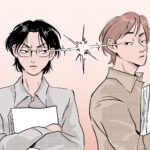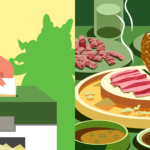สัมภาษณ์งานไม่ผ่าน เธอไม่รัก เพื่อนไปเที่ยวไม่ชวน สารพัดความผิดหวังจากการถูกปฏิเสธสามารถเกิดขึ้นกับเราได้ในทุกช่วงวัย ตั้งแต่ยังเป็นเด็กตัวน้อย จนถึงวันที่เติบใหญ่ก็ยังต้องเจอกับปัญหานี้เสมอ เพราะสิ่งนี้มักจะเกิดขึ้นจากปัจจัยภายนอกที่เราควบคุมไม่ได้ เราไม่รู้ว่าเราจะถูกใครปฏิเสธในวันไหน เมื่อไหร่ เลยไม่อาจเตรียมใจได้ทัน
เมื่อเกิดความผิดหวัง คำถามมากมายตามมาในหัว เรายังดีไม่พอหรือเปล่า? เราทำอะไรพลาดไปตรงไหน? พาให้เจ็บไปถึงในใจ จนบางครั้งก็ไม่อาจรู้ได้เสียด้วยซ้ำว่าต้องรับมือยังไงกับความเว้าแหว่งในใจนี้
หากใครที่กำลังมองหาทางออก The MATTER ชวนทุกคนมาสำรวจแผลในใจ โดยเฉพาะเรื่องการถูกปฏิเสธที่ควบคุมไม่ได้ และเกิดขึ้นกับเราได้อยู่ตลอดเวลา เมื่อเราต้องเผชิญกับปัญหา เราพอจะทำอะไรกับเรื่องนี้ได้บ้าง? กับดร.กาย วินช์ (Dr.Guy Winch) นักจิตวิทยา ผู้เขียน ซ่อมแซมสุขที่สึกหรอ (EMOTIONAL FIRST AID) และเล่มล่าสุดซ่อมแซมใจแล้วไปต่อ (How to fix a broken heart) หนังสือที่เป็นเหมือนคู่มือดูแลใจจากความผิดหวังที่เกิดขึ้นรอบตัวเรา ตั้งแต่เรื่องในชีวิตประจำวันไปจนถึงความผิดหวัง
หนังสือทั้ง 2 เล่ม ถ่ายทอดมาจากประสบการณ์ความเจ็บทางใจของดร.กาย วินช์ โดยเล่าว่า เขามักบอกคนอื่นเสมอว่าตัวเองก็เป็นมนุษย์คนหนึ่ง เขาเคยเผชิญการถูกปฏิเสธ ความล้มเหลว ความรู้สึกผิด และความสูญเสียมาไม่ต่างกัน เขาจึงเริ่มเขียนหนังสือด้วยเหตุผล 2 ข้อ คือเขาต้องการช่วยเหลือผู้คน และต้องการเยียวยาจิตใจด้วยการสร้างคู่มือเยียวยาใจให้ตัวเอง และถ้าหากสิ่งนี้ได้ผลดี เขาก็ยินดีที่จะส่งต่อสิ่งนี้ให้กับคนอื่นด้วย

The rejection is something that can’t be controlled, so how should we respond when we are rejected by someone? (การถูกปฏิเสธเป็นเรื่องที่เราควบคุมไม่ได้ เราจะรับมือยังไงเมื่อถูกใครสักคนปฏิเสธ?)
Dr. Guy Winch: So, we can’t have control over the fact that ‘we get rejected’ because we get rejected a lot. And these days, we get rejected much more because of social media. Because you post something on social media, you have a hundred friends to like it, 98 rejections. So, people feel rejected all the time. And it’s very, very painful. And what people don’t understand is that we are wired to experience rejection as painful.
There are studies in which people were rejected by people they hate, and it was still painful. Even if they were rejected by people they absolutely hate, it’s painful. And they were like, well, why does it hurt? Because we are wired to experience rejection as painful. It had a function in our past. And so, the first thing people need to understand about rejection is the fact that it hurts. That does not mean that you really like the person, that the person was important to you, or that there’s anything wrong with you. That’s just natural.
ดร.กาย วินช์: เราไม่อาจควบคุมข้อเท็จจริงที่ว่า ‘เราถูกปฏิเสธ’ ได้ เพราะเราถูกปฏิเสธกันอยู่บ่อยครั้ง และทุกวันนี้เราถูกปฏิเสธกันมากขึ้นเพราะโซเชียลมีเดีย เมื่อคุณโพสต์อะไรสักอย่างลงบนโซเชียลฯ คุณมีเพื่อน 100 คน แต่ 98 คนไม่ชอบคุณ ผู้คนจึงรู้สึกถูกปฏิเสธตลอดเวลา นั่นเป็นความเจ็บปวดอย่างยิ่งยวด และสิ่งที่พวกเขาไม่เข้าใจก็คือ เราถูกเชื่อมโยงให้รับรู้ว่าการถูกปฏิเสธคือความเจ็บปวด
มีงานวิจัยที่บอกว่าผู้คนถูกปฏิเสธโดยคนที่พวกเขาเกลียด ก็ยังรู้สึกเจ็บปวดไม่ต่างกัน แม้ว่าพวกเขาจะถูกปฏิเสธโดยคนที่พวกเขาไม่ชอบที่สุดก็เถอะ แต่มันก็ยังเจ็บปวด แล้วก็จะสงสัยว่าทำไมมันถึงเจ็บปวดล่ะ? นั่นเพราะเราถูกเชื่อมโยงให้รับรู้ว่าการถูกปฏิเสธคือความเจ็บปวด ซึ่งมีเหตุผลเบื้องหลังกับมนุษย์เราในอดีต ดังนั้น สิ่งแรกที่เราต้องเข้าใจเกี่ยวกับการถูกปฏิเสธ คือความจริงที่ว่ามันเจ็บปวด นั่นไม่ได้หมายความว่าคุณชอบคนคนนี้ หรือคนคนนั้นมีความสำคัญต่อคุณ หรือมีอะไรผิดปกติเกิดขึ้นกับคุณ มันเป็นเรื่องธรรมชาติ

Dr. Guy Winch: When we were many thousands of years ago, we lived in tribes. And we were hunter-gatherers in tribes. And you couldn’t survive without your tribe. Because alone, you couldn’t survive. So, the theory is that rejection was an early warning system to let people know that they’re in trouble in their tribes so they can fix their behavior.
Now, the people who experienced rejection as painful were more likely to fix their behavior. The people who didn’t experience rejection as painful didn’t fix their behaviour, got kicked out of the tribe, and didn’t pass along their genes. So over generations, the people who felt most pain were most likely to stay. So, it wired our brain to experience it as painful.
ดร.กาย วินช์: เมื่อหลายพันปีก่อน เราอาศัยอยู่กันแบบชนเผ่า พวกเราเป็นชนเผ่าที่ล่าสัตว์ เก็บของป่าเป็นหลัก คุณอยู่รอดไม่ได้หากไม่มีชนเผ่าของคุณ เพราะหากอยู่ตัวคนเดียว คุณจะเอาตัวไม่รอดอยู่แล้ว ดังนั้น ทฤษฎีก็คือการปฏิเสธถือเป็นระบบเตือนภัยล่วงหน้า เพื่อให้ผู้คนรู้ว่าพวกเขากำลังมีปัญหาในชนเผ่าของตัวเอง เพื่อที่พวกเขาจะได้แก้ไขพฤติกรรมของพวกเขาได้
ทีนี้ คนที่ถูกปฏิเสธและรับรู้ว่ามันเจ็บปวด คือคนที่มีแนวโน้มที่จะแก้ไขพฤติกรรมของตนเอง ส่วนคนที่ไม่ได้มองว่าการถูกปฏิเสธคือความเจ็บปวด และไม่แก้ไขพฤติกรรมของตัวเอง ก็จะถูกไล่ออกจากชนเผ่าไป และไม่ได้ถ่ายทอดยีนของตัวเอง ดังนั้น ผู้คนที่รู้สึกเจ็บปวดมากที่สุดก็มักจะยังคงอยู่ต่อไปจากรุ่นสู่รุ่น มัน (การถูกปฏิเสธ) จึงเชื่อมโยงกับสมองของเราให้รับรู้ว่ามันคือความเจ็บปวด

Some people always decide themselves and see themselves in a negative way. How to turn self-rejection into self-acceptance? (บางคนมักตัดสินตัวเองและมองตัวเองในแง่ลบเสมอ เราจะสามารถเปลี่ยนการไม่ยอมรับตัวเองเป็นการยอมรับในตัวเองได้ยังไง?)
Dr. Guy Winch: One of the most natural things that happens when we get rejected is we get very self-critical. We start saying things to ourselves in our head which are terrible. We would never say to a friend some of the things we say to ourselves. “I’m a loser. I’m unattractive. I’m stupid. What’s wrong with me?” And I say that rejection is a small wound. And when we get a small wound, we take a knife, and we make it a big wound ourselves. And it’s the absolute wrong thing to do.
I say to people, “what benefit do you get from this negative self-talk?” People say, “um, well, um, yeah, um, well, oh, I know, it will prepare me for next time.” And I’m like, no, it will lower your confidence, so it does the opposite. It makes you more nervous the next time.
And it has no utility, it has no use. Negative self-talk is just damaging. So, what you need to substitute, you need to change it, you need to catch it, and ask yourself, if my dear friend was going through the same thing, would I ever say to them, well, because you’re a loser, because you’re not attractive, because, no, I would be supportive. I would say, but you’re a great person, but you’ll find the right person, or that wasn’t your fault. And so, we are so much nicer to our friends than we are to ourselves, and it should be the same. We should treat ourselves with the same kindness that we treat our friends.
ดร.กาย วินช์: สิ่งหนึ่งที่เป็นเรื่องธรรมชาติที่สุดที่เกิดขึ้นเมื่อเราถูกปฏิเสธก็คือ เรามักจะวิจารณ์ตัวเองหนักมาก เราเริ่มพูดอะไรแย่ๆ กับตัวเองในหัว เราจะไม่พูดกับเพื่อนในสิ่งที่เราพูดกับตัวเอง “ฉันมันขี้แพ้ ฉันไม่น่าดึงดูดเอาซะเลย ฉันมันโง่ ฉันผิดปกติตรงไหน” และผมจะบอกว่าการถูกปฏิเสธเป็นเพียงบาดแผลเล็กๆ และเมื่อแผลของเราเล็ก แต่เราเอามีดไปทำให้แผลใหญ่ขึ้นเอง มันจึงเป็นสิ่งที่ผิดอย่างยิ่ง
ผมมักจะพูดกับคนอื่นเสมอว่า “คุณได้ประโยชน์อะไรจากการที่พูดกับตัวเองในแง่ลบขนาดนี้?” และพวกเขาก็จะบอกว่า “อืม แหม ก็แบบ ฉันจะได้เตรียมรับมือกับมันในครั้งต่อไปไง” แต่ผมว่าไม่หรอก คุณกำลังลดความมั่นใจของตัวเองลง และมันให้ผลตรงกันข้าม และมันจะทำให้คุณวิตกกังวลในครั้งถัดไป
และมันไม่มีประโยชน์อะไรเลย การพูดกับตัวเองในแง่ลบเป็นเพียงการสร้างความเสียหาย ดังนั้น สิ่งที่คุณต้องทำแทน ต้องเปลี่ยนแปลง ต้องจับไว้ให้มั่นให้ได้ และถามตัวเองว่า ถ้าเพื่อนรักของฉันกำลังเจอเหตุการณ์แบบเดียวกัน ฉันจะพูดกับพวกเขาได้ไหมว่า “ก็เธอมันขี้แพ้ เธอไม่มีเสน่ห์” ไม่หรอก คุณจะคอยสนับสนุน คุณจะพูดว่า “คุณน่ะดีแล้ว แต่คุณจะเจอคนที่ใช่” หรือ “นั่นไม่ใช่ความผิดของคุณ” เราจะทำดีกับเพื่อนเรามากกว่าที่เราทำกับตัวเองอยู่เสมอ เราควรปฏิบัติกับตัวเองเหมือนกัน ด้วยความใจดีแบบเดียวกับที่เรามอบให้เพื่อนของเรา

Rejection is associated with many feelings such as shame, loneliness, hurt, and jealousy. Is accepting the best way to deal with rejection? (การถูกปฏิเสธเกี่ยวข้องกับหลากหลายอารมณ์มาก ทั้งความอับอาย ความเหงา ความอิจฉา แล้วการยอมรับความจริงจะเป็นหนทางเดียวที่จะรับมือกับการถูกปฏิเสธหรือเปล่า?)
Dr. Guy Winch: A basic assumption to me and to psychologists in general, is that our feelings are what they are. We don’t control them that much. We can control what we do after we feel, but we can’t, the feelings just happen. So, it’s like you have to accept how you feel, because you are not in control of how you feel.
And if you feel bad for ‘feeling bad’, you’re making it worse. And so, it starts with accepting that it’s okay to feel upset. It’s okay to feel embarrassed. It’s okay to feel shame. Whatever you feel is natural and okay, step one. Step two, once you accept, this is what I feel, then you can start to do something to help the feeling. But you have to start with accepting that this is how you feel.
So, it’s also important to accept the feelings for what they are. Stay with them, learn from them, but then don’t get stuck. Move away from them. And that’s when the tools become important. And my experience has been that, and why I wrote this book and both books, is because people don’t have those tools. And people need those tools. And people are not even aware that there are tools.
ดร.กาย วินช์: ข้อสันนิษฐานพื้นฐานสำหรับผมและนักจิตวิทยาโดยทั่วไป ก็คือความรู้สึกของเราคือสิ่งที่เราเป็น เราไม่ได้ควบคุมมันมากขนาดขั้น เราสามารถควบคุมสิ่งที่เราทำหลังจากที่เรารู้สึกได้ แต่ความรู้สึกมันเกิดขึ้นเอง ดังนั้น มันเหมือนกับว่าคุณต้องยอมรับความรู้สึกของตัวเอง เพราะคุณไม่สามารถควบคุมความรู้สึกของตัวเองได้
และถ้าคุณรู้สึกแย่ เพราะ ‘รู้สึกแย่’ คุณก็กำลังทำให้มันแย่ลง มันจึงเริ่มต้นด้วยการยอมรับว่ารู้สึกเสียใจได้ ไม่เป็นไรที่จะรู้สึกอับอาย ไม่เป็นไรที่จะรู้สึกละอายใจ สิ่งที่คุณรู้สึกเป็นเรื่องธรรมชาตินั่นคือขั้นตอนที่ 1 ขั้นตอนที่ 2 คือเมื่อคุณยอมรับว่านี่คือสิ่งที่เรารู้สึก คุณก็สามารถเริ่มทำอะไรบางอย่างเพื่อช่วยให้รู้สึกดีขึ้นได้ แต่คุณต้องเริ่มต้นด้วยการยอมรับว่านี่คือสิ่งที่คุณรู้สึก
สิ่งสำคัญคือ เราต้องยอมรับความรู้สึกในสิ่งที่พวกเขาเป็น อยู่กับความรู้สึกนั้น เรียนรู้จากอารมณ์นั้น แต่อย่ายึดติด ต้องก้าวออกมาจากมันด้วย และนั่นคือเวลาที่เครื่องมือจะสำคัญ ประสบการณ์ของผมก็เป็นอย่างนั้น และทำไมผมถึงเขียนหนังสือทั้ง 2 เล่มนี้ นั่นก็เพราะว่าพวกเขาไม่มีเครื่องมือเหล่านั้น เขาต้องการมัน และเขาไม่รู้ด้วยซ้ำว่ามีเครื่องมือนี้อยู่

Dr. Guy Winch: Some people will say to me, my girlfriend broke up with me, my boyfriend broke up with me. I’m not going to date now for six months. I’m like, that’s very random. Like, why? I can’t deal with it. Like, you can’t deal with it today. You don’t know how you’re going to feel tomorrow, let alone in six months. And I’m like, aren’t you looking for love? Isn’t that why you were dating in the first place?
There’s information on feelings that can be very useful. So, for example, if you feel resentment as a feeling, that’s usually about feeling something that’s unfair. And so, then you’re thinking, what’s unfair? Maybe I need to do something about this. When you feel rejected, sometimes people get rejected most times. They don’t know why they were rejected. They just got rejected. And so, then we fill in why, and you make it up in your head.
“Oh, I feel insecure, so maybe my hair is not good” or “I didn’t wear the right clothes.” You’re just making that up. You don’t know that that’s the case. And so that’s when you can actually do something to remind yourself of your good qualities, to remind yourself of, the fact that, in dating, for example, most rejection is about chemistry. It’s just, the key and the lock don’t match. it’s not that you’re not good enough. You are great for that person, but not for that person.
ดร.กาย วินช์: บางคนบอกกับผมว่า เลิกกับแฟนและไม่ได้เดตกับใครเลยมา 6 เดือนแล้ว ผมว่ามันน่าแปลกใจเหมือนแบบ ทำไมกัน? เราถึงไม่สามารถจัดการกับมันได้ เช่น คุณไม่สามารถจัดการกับมันในวันนี้ คุณไม่รู้ว่าพรุ่งนี้คุณจะรู้สึกอย่างไร ไม่ต้องไปพูดถึงในอีก 6 เดือนข้างหน้าเลย และผมก็คิดว่า “คุณไม่ได้มองหาความรักเหรอ?” “นั่นเป็นเหตุผลว่าทำไมคุณถึงออกเดตตั้งแต่แรกใช่ไหม?”
มีข้อมูลบางอย่างอยู่ในอารมณ์ ซึ่งมันเป็นประโยชน์อยู่ เช่น ถ้าคุณรู้สึกขุ่นเคืองใจก็มักจะเป็นความรู้สึกเกี่ยวกับอะไรที่ไม่ยุติธรรม บางทีคุณอาจต้องทำอะไรบางอย่างเกี่ยวกับเรื่องนี้ เมื่อคุณรู้สึกว่าถูกปฏิเสธ บางครั้งผู้คนก็มักถูกปฏิเสธอยู่ตลอด พวกเขาไม่รู้ว่าทำไมเขาถึงถูกปฏิเสธ พวกเขาแค่ถูกปฏิเสธเฉยๆ เราเลยตอบคำถามว่า ‘ทำไม’ด้วยการคิดไปเองในหัว
“โอ้ ฉันรู้สึกไม่มั่นใจ นี่ผมของฉันดูไม่ดีหรือเปล่า” หรือ “ฉันไม่ได้สวมเสื้อผ้าที่เหมาะกับตัวเองเอาซะเลย” คุณแค่กำลังสร้างเรื่องนั้นขึ้นมา คุณไม่รู้ว่ามันเป็นอย่างนั้นจริงๆ หรือเปล่า และนั่นคือเวลาที่คุณจะสามารถทำอะไรบางอย่าง เพื่อเตือนถึงข้อดีของตัวเอง เพื่อเตือนตัวเอง อย่างในการเดตกัน การถูกปฏิเสธ ส่วนใหญ่เป็นเรื่องของเคมี แค่ลูกกุญแจกับแม่กุญแจไม่เข้าคู่กัน ไม่ใช่ว่าเราไม่ดีพอ เราแค่ไม่ใช่สำหรับเขาเท่านั้นเอง











